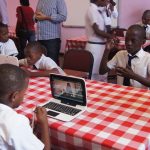The Durban School for the Hearing Impaired (DSHI) has taught thousands of deaf and hearing impaired children from grades one to 12 since it was opened in 1969, and has produced alumni who have become a success in different fields. The school has, up until now, used traditional forms of learning in its classroom but thanks to launch of a new scheme is embracing digital technology to help give its kids even more of an edge.
DSHI, together with Intel and KOLOK SA, launched the KOLOK Education Solution (K-ED) pilot project at the school last week. The pilot has connected the school to high-speed broadband using existing railroad fibre optics infrastructure for the first time. The plan is to use this network provide connectivity to schools nationwide courtesy of InterSite, a subsidiary of the Passenger Rail Agency of South Africa (PRASA).
These railroad fibre optics are said to be able to provide a faster, more reliable and affordable internet connection. PRASA has committed to providing uncapped data to the school for the next three years.
The concept for the technology to be brought to the school was drawn up in July 2014 at an ICT forum for the disabled where Intel and attendees including teachers and the Department of Education engaged with each other to showcase the value of tech for the disabled community.
After a series of training sessions for teachers offered by Microsoft, Vastratech, Sapient and Edit Microsystems in Windows 8, interactive white boards and software specially designed for learners with a disability.
Teaching with K-ED officially began in February this year when the school received 20 Android tablets from KOLOK, 10 Samsung teacher laptops and one SMARTboard.
By the end of the year, DSHI and Intel hope to see the integration of elearning in similar environments being successful and becoming a norm and for it to deliver on its promises by equipping kids with disabilities with the necessary skills they need to thrive once they leave school.
Learning material preloaded onto the tablets include Scratch, a program that teaches kids to code, as well as a video program that kids can use to shoot and edit their own real videos and art programs where they can draw and paint on the tablets.
Videsha Proothveerajh, country general manager of Southern Africa for Intel, says that the firm strongly believes in a holistic education transformation model for all school children that includes all aspects from professional development, content, devices and connectivity, enabled by an ecosystem that brings it to market.
“Technology assist society to leapfrog many of the challenges that would have traditionally been a barrier to individuals fulfilling their potential,” she says.
“Since we’ve started with this pilot project, we’ve been able to implement programs to assist learners with their school work,” says Mr Maharaj, IT teacher at DSHI. “Science has become interactive and more real to learners even in the short period of time that we have had it. Scratch is also helping them a lot with their maths skills and the use of tablets overall is very exciting for them.”
From what some of the kids told me about their experience with the tablets and classes, it’s more fun and interesting for them to read, draw and learn as the technology is more engaging and visually exciting.
DSHI’s principal says she hopes the school can set the pace and pave the way for other special needs schools to adopt elearning in their classrooms to help empower and inspire children with disabilities.
See more photos of learners from DSHI engaging with the tablets and K-ED content in the gallery below.








